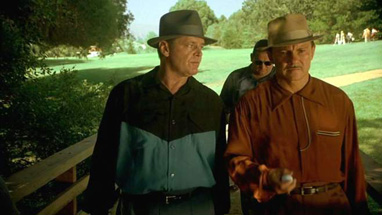|
|
Chapter Two: The Two JakesBy Brett BeachJuly 2, 2009
It is the specter of Cross that - for better and for worse - hangs over The Two Jakes. It would have been foolhardy to bring the character back with another actor (Huston had died in 1987) or to create a similar kindly face of evil (although Richard Farnsworth as an oil baron suggests similar veins of false joviality and aw-shucksness). Cross was never meant to be the focus of the second chapter; it is Katherine (played here by Meg Tilly), Evelyn's daughter/sister, and her relationship with her failed protector Gittes that is at the heart of Townes' screenplay. The level of menace that Cross/Huston brought ends up being missed, however. It is also brave that The Two Jakes makes no attempt to forge Chinatown-like twists and turns into its story. The flip side is that after a certain point, the two hour and 15 minute tale becomes dramatically inert, and in one crucial aspect, treads water mercilessly. Nicholson stepped into the director's chair (Polanski was in the midst of his still continuous exile from the United States and Townes' attempt to head the production back in the mid-1980s hadn't met with much confidence) for only the third time in his career, following the sports drama Drive, He Said (1971) and the offbeat western Goin' South (1978). Being an actor, Nicholson favors quiet moments and quirky dialogue exchanges over spectacle and really, aside from some bookending explosions, there is no action in The Two Jakes.. Nicholson (the director) has an obvious affinity for the character of Gittes and exhibits a remarkable restraint in keeping Nicholson (the actor) from engaging in any numbers of scenery chewing that could derail the story. Gittes in The Two Jakes is now a decade older, a veteran of WWII and living fairly comfortably. He is still the (wobbly but dependable) moral compass of the story. As he addresses someone at one point, "My business may be disreputable but I'm not. I'm the leper in town with the most fingers."
|

|
|
|

|
Friday, November 1, 2024
© 2024 Box Office Prophets, a division of One Of Us, Inc.


